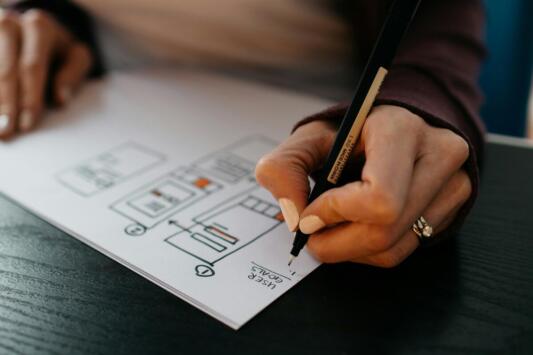How to Be More of Who You Are
Career Discovery, Career Enrichment, Confidence, Self Awareness, Women Empowerment

I, like many others I know, have a tendency to want what I don’t already have. Not necessarily in material goods, but in attributes and skills. When I moved to the US at a young age, I noticed the increased level of creativity my fellow classmates exhibited. They seemed so skilled at creating beautiful art and making cool crafts. I could never get my art to look like theirs. I didn’t have the same extraordinary imagination, the eye for colors, the technique to paint (inside) the lines. While I tried and tried, but I was barely mediocre. I would get frustrated that I couldn’t do what the other kids could.
I questioned myself and my abilities – why am I not as good? After all, society and people often give you feedback on what you need to be better at, not what you’re already good at. I invested all of my energy and time into practicing and trying to be better, but that only frustrated me more. I would get upset and feel crappy that I wasn’t as good as the other kids. After observing my habits for years, my dad (who continues to be a big influence and my coach in life) sits with me and says:
“You have your weaknesses and you have your strengths. While you need to improve your weaknesses, don’t spend your life trying to make up for them. Do something that uses your strengths and people will recognize you and you’ll be happier.“
He was right. No matter how hard I try, I will never be Picasso. Nor will I be anything close to my talented classmates. It just isn’t my thing. I find that when we only focus on our weaknesses and ignore our gifts, we start losing confidence and feel more frustrated – I see this almost daily with my clients.

What Are Your Strengths?
As a coach, the majority of my conversations with clients start with them saying, “Here are all of the things I need to work on.” They then give me a plethora of things they want to work on. And while that’s great self awareness and dedication to improve, I respond back with, “Tell me about your strengths. What are they?” This catches my clients off guard. They respond with uncertainty and hesitation, eventually providing me a list with a few strengths. This list is typically half of the size of the things they want to improve on. I encourage my clients to flush out their strengths and once we have a comprehensive list of both strengths and weaknesses, we discuss how they can use those strengths to work on the things that need improving.
For example, I recently had a client who wanted to be more assertive. This client identified empathy as a big strength, which led us to set strategies on how to be assertive while using empathy. She became particularly skilled at being assertive when needed while making sure it was done in a way that made the recipient feel heard and respected.
Where Is Your Energy?
In life – at work, at home – we all need to work on the things that we’re not good at. There’s no denying that. I often hear from clients that they need to be better with having difficult conversations. That’s a critical skill to have at work and outside of work and you should absolutely have the skills to have those difficult conversations. The problem I encounter is when all of the energy and effort is put into making the weakness a strength.
You can work months and months on being able to have a difficult conversation; you do it so it’s not a detriment to you and your work and personal life. At the end of it, most likely, you’re not going to transform into the expert in having difficult conversations. Realistically, it might still be uncomfortable for you but manageable and no longer a detriment to you and your development. But all this time, what happened to your strengths? They were put on the backburner while you focused only on your weaknesses.

Embrace Yourself: Be More Of Who You Are
Now think Sheryl Sandberg. What comes to mind? Probably her remarkable book Lean In, her leadership at Facebook and her advocacy to build resilience and support women. Rightfully so – you recognized her for what she’s known for. One of Sheryl’s greatest strengths is being authentic. She embraces her strengths and she acknowledges her weaknesses. What if Sheryl spent all of her time working on her weaknesses? What if she didn’t use her strength of being authentic and speaking out against gender bias?
If Sheryl Sandberg did not embrace her gift for being authentic and standing up for what she believes in, I’m not sure if Lean In would have been published. I’m not sure if the movement she created would exist. Sheryl Sandberg spent more time on her strengths rather than only focusing on her weaknesses and this contributed to the impact she has today.
Often times I tell my clients to think of strengths as a muscle. You have to keep working it out so that it gets stronger and more defined. The more time and effort you can put into your strengths, defining it and refining it, the more you will be happier, confident and successful. After all, your strengths are what make you unique. Your strengths give you recognition. They make you more confident. We all know what Sheryl Sandberg is known for. What are you known for?
“You cannot be anything you want to be – but you can be a whole lot more of who you already are.” ― Tom Rath


